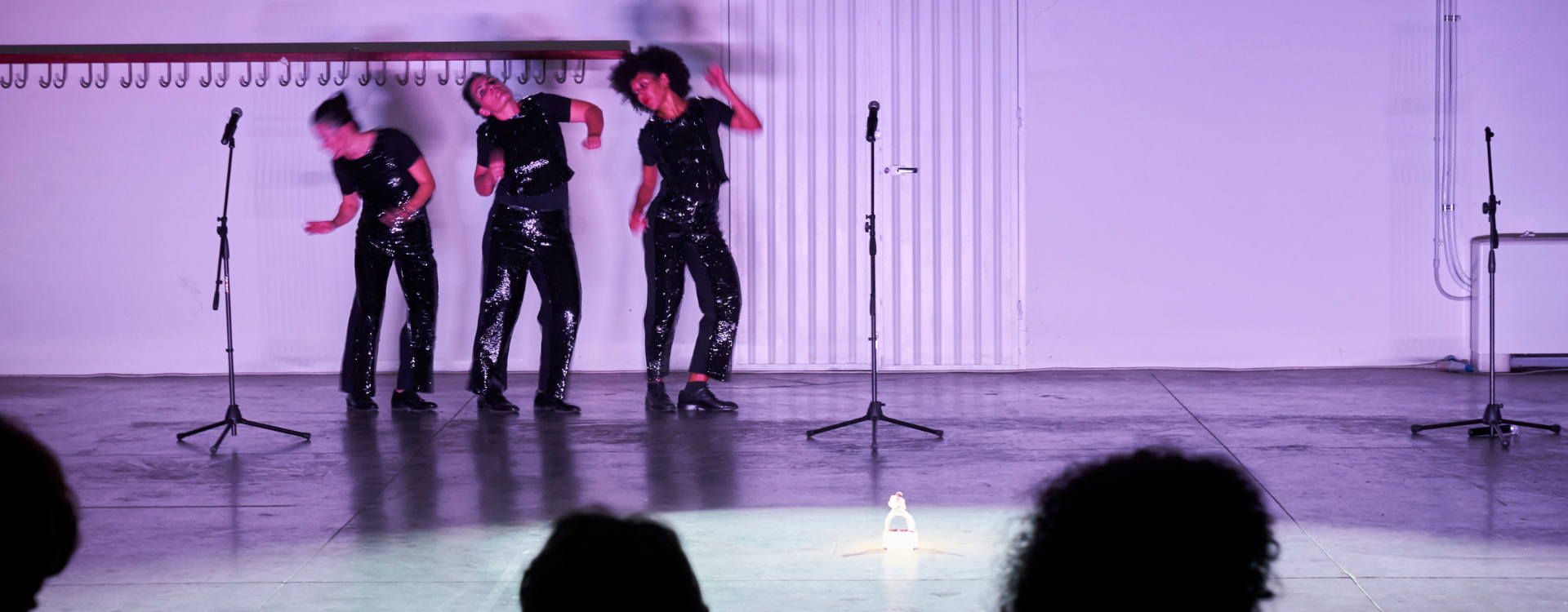And The Colored Girls Say: Doo Da Doo Da Doo Da Doo is a choreographical survey on the scenic edge as a metaphor of the social margin. Enacting the anonymus place that background choristers have in american pop culture, Elisabetta Consonni outlines them like a chiaroscuro of bodies and voices in the shadow of the limelight. It is a concert of voices outside the chapter, of second voices, extras and backgrounds. It’s a show without the star, it is what is around the focused object in an image, it’s the white around the written words. It is anything beyond a margin line and not allowed to enter the bright area of the limelight.
A precise intention is needed to distinguish the choruses of the background singers of a song and isolate them from the main voice, as well as to notice the backgrounds and everything around a central object on which our attention is directed. It is essential to activate what the architect Juhani Pallasmaa calls peripheral vision, a natural ability of each of us, made lazy however from a centuries-old education in perspective view directed towards a hegemonic center-vanishing point to which our attention is directed. It is this peripheral vision that makes us notice the margin, where one cultivates one’s horizon in the circumscribed limit of small established movements and rhythms, where one remains secondary elements, counterparts of other protagonists, accessories, periphery.
It is in that margin that a generative humanity lives. And The Colored Girls Say: Doo Da Doo Da Doo Da Doo (from Walking on the wild side by Lou Reed) is a declaration of love towards all of this. It’s a “Praise of the Margin” (b.h.)
Elisabetta Consonni And The Colored Girls Say: Doo Da Doo Da Doo Da Doo

Have you ever gone to a concert with no main star?
Elisabetta Consonni choreographs everything, human and inhuman beings, mobile and static objects, maps, interstice and spatial holiday groups. She creates relationship networks, thin and strong, like sugar glass.
She holds a degree in Communication, with a final thesis on the social construction of the body in dance. Graduated at The Place-London, she then examined in depth her research on performing art living in The Netherlands (2004-2009 and in Poland (2013-2015). Her works try to expand choreography while trying to find performative devices to incorporate social dynamics and themes. Her social and civic activism takes the artistic shape of a research process (documented in ergonomicaproject.wordpress.com) that has been documenting the use and the meaning of public space and the declination of the choreographical skills in communitarian practices.
Ideation and Choreography | Elisabetta ConsonnI
Interpreter | Daniele Pennati, Masako Matsushita, Elisabetta Consonni, Susanna Iheme
Choreographical Assistance | Francesco Dalmasso
Light Design | Irene Innocenti – Maria Virzì
Rhythmic Consulence | Fabrizio Saiu
Costumes| Indetail Lucia Sandrini
Vocal Consulence | Chiara Osella
Production| Teatro Grande di Brescia, Aiep-Ariella Vidach
With the help of | Zona K, Ilinx, theWorkRoom-Fattoria Vittadini, Zona K
- Duration 45'
- Doors opening at H20:45